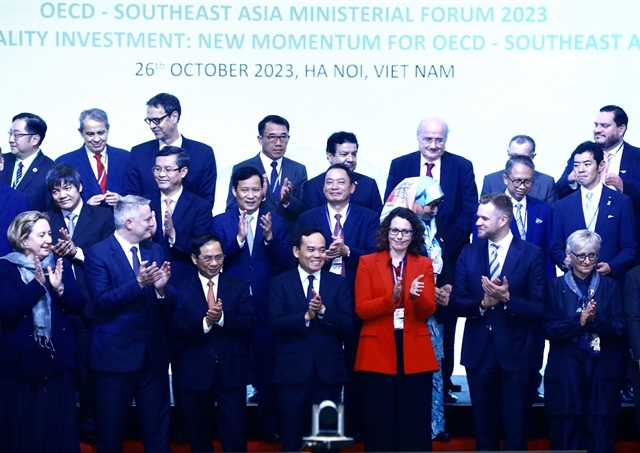 Politics & Law
Politics & Law


|
| Deputy Prime Minister Trần Lưu Quang (first row, centre), Alicia Payne, Member of Parliament of Australia (third, right) and other participants at the OECD – Southeast Asia Ministerial Forum 2023 on Thursday afternoon in Hà Nội.—VNA/VNS Photo Lâm Khánh |
HÀ NỘI — The Organisation for Economic Cooperation and Development (OECD) should strengthen policy advice, enhance technical support, and promote experience sharing with Southeast Asian countries to improve institution building and enhance national governance capacity for sustainable investment in order to further promote OECD - Southeast Asia investment cooperation in the future.
Deputy Prime Minister Trần Lưu Quang made the suggestion at the OECD – Southeast Asia Ministerial Forum 2023 with the theme Sustainable and Quality Investment: New Momentum for OECD Southeast Asia Partnership, organised on Thursday afternoon in Hà Nội.
The forum was held at the ministerial level, with ministers from Australia and Việt Nam co-chairing proceedings along with the OECD Secretary-General, Mathias Cormann.
Quang also said that the two sides were committed to effectively implementing the OECD-ASEAN Memorandum of Understanding, promoting priority projects, especially on taxes, facilitating trade and investment; coordinating to standardise and harmonise investment regulations, policies on environmental protection and green investment.
The two sides should create motivation for investment cooperation on sustainable development in emerging and key areas such as energy transition, green growth, digital economy, circular economy, and ecological agriculture, he added.
He called on OECD countries to cooperate with Southeast Asian countries to build centres of high technology and innovation, thereby helping ASEAN to reach its full potential and become a global semiconductor supply chain linkage centre as well as technology research and development centres, adapting to climate change.
Additionally, the two sides were asked to support the establishment of foundations for sustainable investment in the region, specifically, cooperation in upgrading and connecting strategic infrastructure in Southeast Asia, strengthening connectivity between Southeast Asia and OECD through supporting the implementation of the Master Plan on ASEAN Connectivity (MPAC) 2025 and infrastructure development initiatives of the OECD and its member countries; developing high-quality human resources to meet the needs of high-tech projects, he said.
The two sides should create models of sustainable and quality investment cooperation, he said.
It needed an effective combination of resources from the State, the private sector, and multilateral development banks, through unifying vision and action among countries, regional and global organisations to meet the huge investment demand, especially in developing countries, he said.
“I believe that, with great potential and advantages, the OECD - Southeast Asia investment partnership will be a model for building global investment partnership frameworks,” he said.
Lastly, the two sides were suggested to constantly strengthen a peaceful and stable environment for cooperation and development, he said.
Việt Nam and ASEAN are always persistent in promoting the resolution of disputes and disagreements through peaceful solutions, he said.
Quang also said he believed that the forum would find many effective and feasible solutions to promote high-quality and sustainable investment, contributing to creating a new driving force for OECD-Southeast Asia relations.
Speaking at the forum, Alicia Payne, Member of Parliament of Australia, said as co-chair of the OECD Southeast Asia Regional Programme (SEARP), Australia was delighted to once again, alongside Việt Nam, welcome participants to the forum.
“We want the Australian business community to take an even greater role in the Southeast Asian growth story over coming decades.”
That’s why the Australian Government last month (September 6) launched a Southeast Asia Economic Strategy to 2040 written by one of Australia’s leading business figures, Nicholas Moore, she said.
“Enabling business and relationships within the region is at the core of that strategy,” she added.
"We were at the beginning of a new era of OECD ASEAN partnership. A few decades ago, significant ASEAN membership in the OECD might have seemed impossible. Even a decade ago, it might have seemed improbable,” she said.
“Today, it is inevitable. But there is much to do,” she said.
And our Government was committed to working with all of you to deepen and broaden OECD and ASEAN cooperation to the benefit of all our peoples, she added.
This is the second time the OECD – Southeast Asia Ministerial Forum has been held in Hà Nội, under the initiative of Việt Nam and Australia as co-chairs of the OECD Southeast Asia Regional Programme (SEARP) in the 2022-25 period.
The forum focused on Southeast Asia at the regional level, considering opportunities for cooperation between OECD members and Southeast Asian countries to encourage sustainable and quality investment. — VNS




